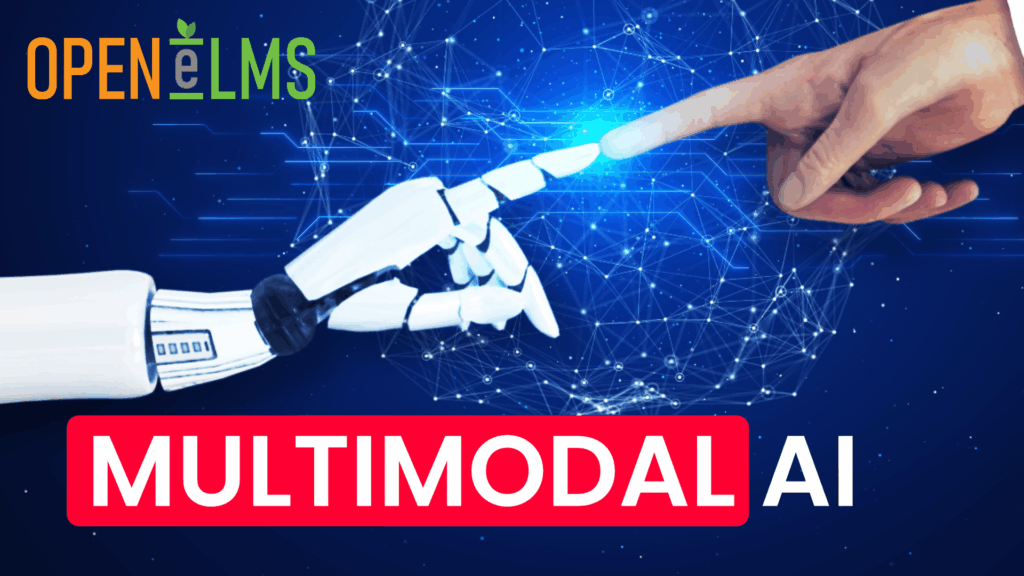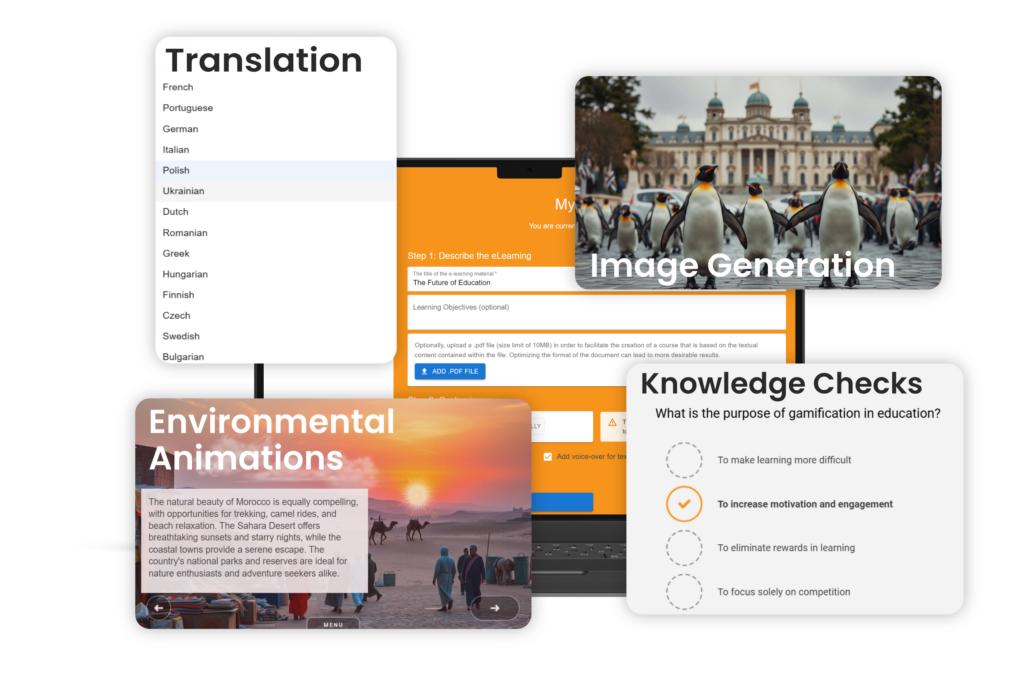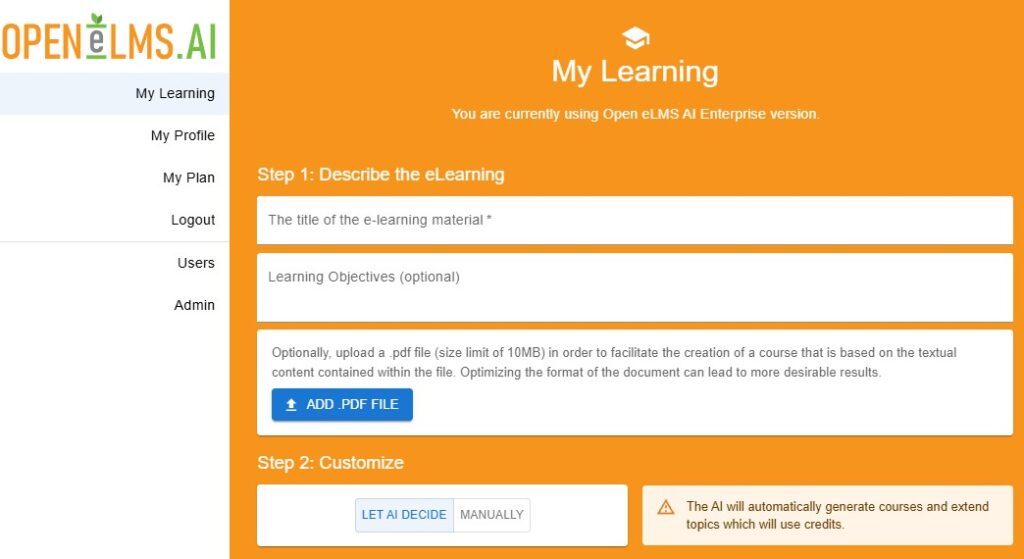AI In the Classroom: A Free Guide for Teachers

Artificial Intelligence is rapidly changing the face of education. While much of the conversation has focused on the risks, there is also enormous potential when AI is used responsibly. At Open eLMS, we believe that with the right tools and guidance, AI can enhance both teaching and learning in meaningful and practical ways. Below, we explore how AI can be introduced into modern classrooms, the opportunities it creates, and the responsibilities it brings. We also demonstrate how Open eLMS AI makes this process easy, by providing a free course you can download and use immediately in your own learning platform. Benefits of AI for Students and Teachers AI can significantly enhance the learning experience for students. It enables adaptive learning pathways tailored to individual progress, helping students receive the right support at the right time. AI-powered tools can provide real-time feedback, suggest next steps based on learner performance, and support various learning styles to make content more accessible and engaging. For teachers, AI reduces the burden of repetitive administrative work. Tasks such as grading objective assessments, tracking attendance, or managing communication can be streamlined through automation. Perhaps more importantly, AI gives teachers insights into student progress and areas of difficulty, allowing for more targeted and effective intervention. Top Online Tutors in the UK suggest that integrating AI into education not only personalises learning but also boosts student motivation by making lessons more interactive. There are AI tools to help educators identify knowledge gaps early, enabling timely support that improves outcomes for students. Ultimately, embracing AI fosters a more efficient and engaging educational environment for both students and teachers. Crucially, AI should be used not only to support content delivery but also to strengthen essential skills. Students must be encouraged to question AI-generated responses, develop their own views, and think critically about the information they are given. AI can be a prompt for inquiry, not just a shortcut to answers. Tools, Integration and Practical Use There are a growing number of AI tools available to schools, colleges and universities. These include virtual tutors, AI-generated lesson plans, text-to-speech accessibility tools, and predictive analytics platforms that can flag students at risk of falling behind. Integrating AI effectively means selecting tools that complement existing teaching strategies. It should begin with clear goals: do you want to improve learning outcomes, reduce admin workload, or personalise learning? AI can help in all these areas, but it works best when integrated with intent and supported by training. Open eLMS AI is designed precisely for this kind of integration. Our platform allows educators to create high-quality eLearning content automatically. You simply input your topic, and our AI builds a complete course structure, complete with learning objectives, narration, quizzes, and interactive content. This empowers educators to deliver dynamic lessons with minimal effort, freeing up time for one-to-one teaching and classroom engagement. Ethical Considerations and Monitoring AI in the Classroom While AI holds great promise, it must be introduced thoughtfully. One of the primary concerns is data privacy – ensuring student information is stored and processed securely. There is also the risk of bias in AI algorithms, which can unintentionally reinforce inequalities if not carefully monitored. Teachers and school leaders need to maintain oversight of how AI tools are used, what decisions they influence, and how students interact with them. Transparency is essential. Educators must be able to explain how a system works and make sure that AI supports, rather than replaces, human judgement. Finally, AI should never become a ‘black box’ in the classroom. Regular reviews of its performance, clarity in its outputs, and open communication with students and parents are all essential to ensure ethical and effective use. Open eLMS is Bridging the Gap Between AI and Education At Open eLMS, we believe AI should empower educators, not overwhelm them. Our AI-driven eLearning authoring tool is designed to make content creation fast, intuitive and aligned with the pedagogical needs of modern education. Whether you’re an academic, a corporate trainer, or part of a public sector learning team, Open eLMS allows you to generate structured, media-rich eLearning content in minutes. You simply provide a topic and guidance, and the AI takes care of lesson planning, quizzes, narration, and even accessibility features, freeing up time for instructional strategy and learner engagement. Your Free eLearning. AI in the Classroom: A Teachers Guide To show how this can be done in practice, we’ve created a short course using Open eLMS AI titled “AI in the Classroom: A Teachers Guide” The course covers: Applications of AI in teaching and learning Benefits and opportunities for students and teachers Encouraging critical thinking in an AI-supported classroom Key ethical considerations View the course here: Access eLearning Create Your Own AI-Powered eLearning This course was created in minutes using the Open eLMS AI authoring engine. If you’d like to try creating your own eLearning material on any topic — from safeguarding to software skills — you can sign up for a free 14-day trial. Access Free Trial AI is here to stay, and it’s reshaping how we learn and teach. With the right tools, educators can harness its power to create more effective, personalised and inclusive learning experiences. I invite you to explore the possibilities, beginning with this course.
How Multimodal AI Is Transforming eLearning, And Why We Built Open eLMS AI to Harness It

When we first started building Open eLMS AI, our goal was simple: make it easier for anyone to create rich, engaging eLearning without needing to be a designer, developer, or AI expert. Multimodal AI is the technology that makes this possible. This video gives you a quick look at how it all works, and why it matters. If you’ve ever wished creating learning content could be faster, more flexible, and more aligned with how people actually learn, this one’s for you. 📺 Watch: How Open eLMS AI Uses Multimodal AI to Build Better Learning Experiences https://www.youtube.com/watch?v=LJgbk9wu8sw Why Multimodal AI? Humans learn through a mix of inputs, reading, watching, listening, doing. Multimodal AI mimics that by creating content across multiple formats all at once: text, images, narration, video, animation, even interactive quizzes. With Open eLMS AI, you can upload a document or type a simple prompt, and the system does the heavy lifting, producing a course that’s ready to go. You still have full control to tweak it and tailor it to your learners, but the hardest parts are handled in seconds. This isn’t just about speed, it’s about creating better learning experiences that actually stick. See It for Yourself! Head to www.openelms.ai, sign up for a 14-day free trial and access all enterprise features, create and keep your very own multimodal eLearning! Access Free Trial
Open eLMS AI Just Got Smarter: 4 Powerful New Features You’ll Want to Try

If you’ve been following the journey of Open eLMS AI, you’ll know we’ve always aimed to make course creation smarter, faster, and more human-centric. I’m really excited to share four new features we’ve recently launched, each designed to save you time, spark creativity, and make your eLearning more effective and accessible than ever before, here’s the breakdown. 🎨1. Create Your Own Images with Our Built-in Image Generator One of the most common bits of feedback we’ve had is that sourcing relevant images slows everything down. So… we fixed that. Now, when you’re building a course with Open eLMS AI, our system can generate custom images that match your content, whether it’s an abstract concept or a workplace scenario. It means no more scouring stock libraries or worrying about copyright. Here’s how it works: 🌍 2. Instantly Translate Courses into Multiple Languages This one’s a game-changer for anyone delivering training globally. With our new built-in translation tool, you can convert your entire course into multiple languages with just a click. The AI takes care of tone, context, and formatting, so it’s not just direct translation, it’s localisation. Watch it in action: ✨ 3. Environmental Animations and Smart Design Heuristics A beautiful course isn’t just nice to look at, it helps learners stay focused and navigate more intuitively. Open eLMS AI now auto-applies design heuristics to your courses, things like layout balance, spacing, and content flow, without you needing to lift a finger. Plus, we’ve added environmental animations that subtly bring scenes to life. Think: blinking lights in a control room or flickering candles in a medieval castle. It’s immersive, but not distracting, just enough to keep learners engaged. Check it out here: 🧠 4. Interactive Knowledge Checks (No Coding Needed) Testing comprehension used to mean writing questions manually or embedding third-party tools. Not anymore. With our new knowledge check system, Open eLMS AI will generate interactions, quizzes, and multiple-choice questions based on your course content. All it needs is a single prompt. It’s all built-in, customisable, and SCORM-compliant,ready to track progress inside your LMS. See knowledge checks for yourself in this final clip: Ready to Try It? We believe in making powerful tools that feel effortless to use, and we’re just getting started. If you’ve got feedback, ideas, or want to see a custom demo, just reach out. All these features are now available in Open eLMS AI, and yes, you can try them right now. Here’s to creating better learning, faster. Head to www.openelms.ai, sign up for a 14-day free trial and access all enterprise features, including the new updates above.
Transforming Policies into Engaging eLearning with Open eLMS AI

https://youtu.be/Qcvn1Az_AqA The Importance of Reading and Understanding Policies In the dynamic landscape of modern organizations, policies and procedures are more than just guidelines—they are the very framework that shapes an organization’s culture and defines its operational ethos. These documents are crucial in establishing the values, expectations, and standards that guide employee behaviour and decision-making. However, the challenge lies in ensuring that these vital documents are not only read but also understood and embraced by all members of the organization. The Power of Process Policies are the backbone of any organization, providing a structured approach to achieving strategic goals while fostering a cohesive culture. They articulate the organization’s mission and values, setting the tone for how business is conducted and how employees interact with one another. By clearly defining roles, responsibilities, and expectations, policies help to create a unified organizational identity and culture. Yet, despite their importance, policies often remain underutilized, perceived as dry and inaccessible. This is where the transformative power of Open eLMS AI comes into play. By converting these essential documents into engaging eLearning courses, organizations can ensure that their policies are not only disseminated but also internalized, leading to a more informed and aligned workforce. Introducing Open eLMS AI Open eLMS AI is a cutting-edge tool designed to revolutionize the way organizations approach eLearning. With its ability to transform static documents into dynamic, interactive courses, Open eLMS AI makes learning both engaging and effective. And the best part? You can experience its capabilities for free with a 14-day trial. Simply upload your document, press generate, and within minutes, receive an engaging eLearning course tailored to your organization’s needs. Features that Engage Open eLMS AI goes beyond mere content conversion. It creates a comprehensive learning experience that includes: Video Presenters and Voiceovers: These elements bring content to life, making it more relatable and easier to understand. Beautifully Designed Learning Worlds: Courses are crafted to reflect your organization’s unique style, enhancing visual appeal and engagement. Knowledge Checks and Trackable Quizzes: These interactive components ensure that learners not only absorb information but also retain it. Flexible Integration Once your course is ready, you have the flexibility to edit it through a user-friendly browser interface, integrate it into your Learning Management System, or share it directly via email. Whether accessed through the Open eLMS App or embedded on your website, the choice is yours. Begin Your Transformation Ready to elevate your organization’s training programs? Discover the transformative capabilities of Open eLMS AI and see how it can turn your policies into powerful tools for cultural and operational alignment. Start your free trial today and witness first-hand how engaging eLearning can drive real change within your organization. Join us in redefining the learning experience and fostering a culture of continuous improvement and engagement. Let’s make learning an integral part of your organizational journey! Ready to Create Your First eLearning Course with Open eLMS AI? Build your first AI-powered eLearning course in minutes, free for 14 days with no card details needed! 👉Try Open eLMS AI for Free Today
How to Create eLearning Courses Quickly & Easily Using AI: A Step-by-Step Guide

Want to create eLearning but don’t know where to start? AI makes it easier than ever. Creating eLearning used to be a time-consuming and complex process, requiring technical skills, instructional design expertise, and endless hours spent formatting content. But thanks to AI, you can now generate professional quality eLearning courses in minutes. If you’ve landed on this article searching for “how to create eLearning” or “how to make eLearning using AI,” you’re in the right place. This guide will walk you through two ways to create an engaging, interactive eLearning course, without needing design experience or technical skills. Method 1) Step-by-Step: How to Create an eLearning Using AI Tools Step 1: Define Your Learning Objectives Before creating content, establish clear learning objectives to guide your course design. Answer the following questions: What do you want learners to achieve? Who is your target audience? What format will best suit your learners (videos, interactive modules, quizzes, etc.)? AI Tools to Use: ChatGPT for brainstorming objectives, instructional design frameworks. Step 2: Choose an eLearning Creation Platform Select a platform that can assist with course creation. Some popular choices include: Articulate 360 Adobe Captivate Synthesia ChatGPT + Canva Tome.app Open eLMS AI Editor Step 3: Generate Course Content Using AI 1. AI for Content Writing Use AI to generate course outlines, lesson scripts, and summaries and key takeaways Tool: ChatGPT, Jasper AI, Writesonic 2. AI for Video and Voiceover Convert text-based content into video-based lessons with AI-generated voices and avatars. Tools: Synthesia (AI avatars & voiceovers), Murf.ai or Play.ht (AI voice narration) 3. AI for Slide & Presentation Creation Create engaging slides and visual presentations. Tools: Tome.app (AI-powered presentations) Canva Magic Write (for AI-generated slide content) 4. AI for Quizzes & Assessments Automatically generate interactive quizzes and assessments. Tools: Quizgecko (AI-generated quizzes), ClassPoint AI (interactive PowerPoint quizzes) Step 4: Personalize Learning with AI Make learning adaptive by using AI-powered analytics and feedback tools. Tools: Docebo AI (AI-driven learning experience platform) Coursera AI (personalized recommendations) Chatbots (for instant learner support) Step 5: Design Engaging Interactions Use AI to add gamification, simulations, or interactive exercises. Tools: EdApp (AI-powered microlearning with gamification) Vyond (AI animated videos) ThingLink (AI-powered interactive images/videos) Step 6: Publish and Host Your Course Decide where to host your eLearning content: LMS (Learning Management System): Thinkific, Teachable, Moodle SCORM/xAPI Compatible Platforms: Adobe Captivate, iSpring Video-based Platforms: Udemy, YouTube, Kajabi So That’s One Way to Create eLearning using AI While we’ve mentioned over 15 AI-powered tools, you don’t need all of them. To build a multimodal eLearning course, you’ll need at least 7, for course content, voiceover narrators, presenters, imagery, design heuristics, assessments, animations and interactive exercises. But there is another option that combines these elements into one AI Powered solution. Method 2) Step-by-Step: How to Create an eLearning Course Using Open eLMS AI For a streamlined, AI-driven approach to eLearning creation, Open eLMS AI offers an all-in-one solution. Unlike using multiple tools, Open eLMS AI simplifies the entire process by generating entire multimodal courses, fitted with voiceovers, animations, assessments, narrators, content, and interactivity. Step 0: Log In to Open eLMS AI (or Sign Up Free for the First 14 Days) You can try Open eLMS AI completely free for 14 days. Create courses, test features, and see the power of AI-driven eLearning for yourself: No credit card required. No software downloads, extensions or plugins needed, Open eLMS AI is completely browser based. Sign up and generate a course in minutes. 👉 Start Your Free Trial Now Step 1: Enter the Title of Your eLearning Start by entering the name of your course, this is your prompt and is all you need to create the eLearning. You also have options to specify your prompt: Add learning objectives to outline the achievement goals intended for course, the AI agent will generate material accordingly. Upload a PDF to create custom eLearning, Open eLMS AI will extract key information for you. Adding detail at this stage will ensure your outcome will be closer to your idealised course. Write your prompt in any language and the AI Agent will create a course, fitted with text, narrators voiceovers and assessments in that language – it’s that simple! Step 2: Customise (or Let AI Do It for You!) Next, choose your course preferences: Style and Tone: Friendly, objective, informative, professional to name a few. Course Length: From Bitesize courses to in-depth learning experience, you decide. Wordiness: Select the detail wanted based on your audience. Document Interpretation: If you’ve added a PDF, adjust the level of interpretation, the AI will work off your document accordingly. Don’t want to make these decisions? No problem—Open eLMS AI can choose the best options for you based on best practices in eLearning design. Step 3: Click “Generate” and the AI Builds Your Course in Minutes Once you’ve entered your preferences, hit “Generate”. The AI will: Create structured content around your chosen topic, with content, learning goals, and an end summary. Add professional design heuristics, animations, and visuals to your eLearning. Generate hyper realistic AI voiceovers for narration, and insert presenters. Create a quiz at the end of the eLearning, and Knowledge checks throughout. Apply instructional design best practices automatically. Within 2 to 10 minutes, your full eLearning course is ready! If you ‘Let AI Decide’ you’ll receive an email notification when it’s done and you can move onto step 5. If not step 4 lets you refine your design further. Step 4: Select Screen Designs or Expand on Topics If you didn’t press ‘Let AI Decide’, at this stage you can preview your course and expand on any topic that needs more detail. Change backgrounds and generate more content. Note that any content can also be edited at the next stage. Step 5: Edit & Customise (If You Want To) Your course is fully designed fitted with multimodal features, but you can tweak and enhance it however you like using the Open eLMS AI in-browser editor: Change visuals & layout – Swap images or animations, choose
Open eLMS AI Exhibition
Redirecting… If nothing happens, click here.
Open eLMS AI: What is an eLearning AI Agent?

For over 22 years, we’ve been perfecting the art of eLearning design. Open eLMS AI is the culmination of that expertise, packed into an AI Agent that makes high-quality course creation faster, easier, and more immersive than ever. Open eLMS AI isn’t just another eLearning tool—it’s an eLearning AI Agent designed to automate and enhance every aspect of digital learning. So, what exactly do you get when you sign up? From AI-generated multimedia content to hyper-realistic voiceovers and animations, here’s a detailed breakdown of the 8 powerful features you get when you join Open eLMS AI. 1) AI-Powered Course Generator With Open eLMS AI, you can generate a fully interactive course in minutes. Simply enter your course description and learning objectives, hit Generate, and within 2 to 10 minutes, the system delivers a complete, multimodal learning experience—including video, audio, animations, and imagery. No more tedious manual work—just high-quality courses, created at the push of a button. 2) Expansive Image Library (75,000+ and Growing) Need the perfect visual for your course? Our AI-curated image library contains over 75,000 images, with new additions every week. Search for any keyword to find relevant, high-quality visuals instantly. Easily integrate images into your course content with a single click. Use AI-selected images or customise your visuals within the editor. 3) AI Image Generation on Demand Can’t find the right image? Create it from scratch! With Open eLMS AI’s manual image generation tool, you can type in a description, and our AI will generate a completely new, unique image for your course. For example, if you need a polar bear in a desert playing with balloons, just type it in—and Open eLMS AI will generate it for you instantly. 4) Animation Library (1,000+ Professional Animations) Engagement is key to learning, and animations bring content to life. With over 1,000 animations developed in-house over 22 years, Open eLMS AI ensures your courses are visually dynamic and immersive. The AI intelligently selects and applies animations where appropriate. Naturalistic movement is incorporated—fire emits smoke, the sun moves in the sky, and objects behave as expected. Icons and motion graphics are added where necessary to reinforce key concepts. 5) AI-Driven Design Heuristics Open eLMS AI isn’t just about content—it’s about design. Our AI follows over two decades of eLearning design expertise, applying professional design heuristics to create visually polished, intuitive course layouts. The AI adapts layouts based on screen space and content type. Presenters, text, and media are positioned for maximum engagement. Courses are formatted to be clear, readable, and interactive. This means that even if you have no design experience, Open eLMS AI ensures your courses look professional every time. 6) Hyper-Realistic Video Presenters & Voiceovers To enhance engagement, Open eLMS AI includes AI-generated video presenters and voiceovers. These hyper-realistic avatars introduce the course, guide learners, and provide closing remarks—creating a more immersive learning experience. Available in multiple languages, with accurate translations at the click of a button. Uses cognitive psychology principles to improve retention and recall. Ensures learners feel like they’re part of a real-world learning environment. 7) AI Assistance & Free Training Unlike other authoring tools that leave you to figure things out on your own, Open eLMS AI provides real-time support to help you succeed. 1-on-1 training sessions for Enterprise users. AI-powered chat assistant to provide on-demand guidance. Video walkthroughs to show you exactly how to edit and refine your courses. 8) Built-in eLearning Editor While Open eLMS AI automates course creation, we also give you full control to refine and personalise your content. The built-in browser-based editor lets you: Edit text and layout using an intuitive drag-and-drop interface. Add quizzes, interactions, and branching scenarios for deeper engagement. Upload custom media including video, audio, and additional graphics. Change branding and narration—adjust the accent, gender, or tone of the voiceover. This isn’t just an authoring tool—it’s a complete eLearning design studio that gives you everything you need to perfect your content. Why Open eLMS AI? Unlike traditional eLearning authoring tools, Open eLMS AI is a comprehensive learning generation system—not just a content creator. With AI-driven automation, built-in expertise, and complete creative control, Open eLMS AI gives you the power to create high-quality, engaging, and accessible courses in record time. Let’s Recap—What You Get When You Join Open eLMS AI: ✅ AI-powered course generator—full multimodal courses in minutes.✅ 75,000+ image library, growing by thousands each week.✅ AI image generation—create any image you need, instantly.✅ 1,000+ animations for rich, dynamic course content.✅ AI-driven design heuristics for professional, polished layouts.✅ Video presenters and voiceovers in multiple languages.✅ AI support & training for effortless onboarding.✅ Browser-based editor for full creative control. With Open eLMS AI, you don’t just get a tool—you get a complete eLearning solution designed to save time, reduce costs, and elevate the quality of digital learning. Want to see it in action? Request a demo today and experience the future of eLearning!
Watch eLearning being created using AI – no cuts

The video showcases the entire process of creating eLearning content using Open eLMS AI. You can watch it here: Creating eLearning using Artificial Intelligence and Open eLMS AI. https://youtu.be/qGetepIdau4 Key Features of Open eLMS AI Automated Content CreationOpen eLMS AI allows users to generate eLearning content from various sources in seconds. This means you can transform documents or text prompts into interactive courses without extensive manual effort. Adding InteractivityOne of the standout features of Open eLMS AI is its ability to incorporate interactivity into courses. Users can easily add quizzes, branching scenarios, and other interactive elements that enhance learner engagement and retention. Animations and MultimediaThe platform supports the integration of animations and multimedia elements. You can choose from a library of professional templates and animations or upload your own images and videos to create a visually appealing learning experience. Video PresentersOpen eLMS AI also allows you to include video presenters in your courses. You can use pre-existing presenters from the library or upload your own, adding a personal touch to your eLearning content. User-Friendly InterfaceThe drag-and-drop interface makes it easy for anyone to create and edit courses without needing extensive training. This accessibility ensures that even those with minimal technical skills can produce high-quality eLearning. SCORM ComplianceCourses created with Open eLMS AI are SCORM compliant, allowing for easy integration with any Learning Management System (LMS). This feature saves time and ensures that your content can be distributed widely. Conclusion Creating professional standard eLearning in minutes is not just a dream anymore; it’s a reality with Open eLMS AI. The combination of automated content creation, interactivity, multimedia integration, and user-friendly design makes it an invaluable tool for educators and organizations alike. To learn more about how Open eLMS AI can transform your eLearning experience, visit Open eLMS.
Reasons to Never Use Artificial Intelligence to Generate eLearning

When it comes to AI and eLearning, let’s be honest — there are some pretty reasonable concerns floating around. Will it stick to the script? Is it just making stuff up? Will my learners feel like they’re being taught by a soulless robot? Enter Open eLMS AI, the game-changer that addresses these worries head-on. Here’s a breakdown of how it nails the balance between cutting-edge tech and user-friendly functionality. 1. Trusting AI to Focus the Message (and Not Go Rogue) One of the biggest fears is that AI might veer off course and create content that misses the mark. Nobody wants a lesson about biology suddenly referencing quantum physics (unless you’re into that kind of crossover). Open eLMS AI takes this concern seriously. It lets you upload your own documents and adjust interpretation settings with a simple slider. Want the AI to stick to your exact words and phrases? No problem. Prefer it to explore related ideas and sprinkle in some broader knowledge? Easy. This slider puts the power in your hands, ensuring the content is focused, relevant, and completely under your control. Think of it as having a super-smart assistant that actually listens. 2. No More “AI Hallucinations” If you’ve heard horror stories of AI making up facts (hello, “AI hallucinations”), you’ll be glad to know those days are mostly behind us. Open eLMS AI takes advantage of the latest advancements in AI tech to generate scripts that are accurate, trustworthy, and ready to teach. It’s like how modern AI can now predict the weather better than some meteorological offices. Open eLMS AI applies that same precision to your eLearning materials. You can confidently build lessons knowing your content won’t be undermined by random, made-up nonsense. 3. Injecting the Human Touch One big complaint about AI-generated content is that it can feel, well, robotic. We’ve all seen it: flat presentations, monotone narrations, and zero personality. Open eLMS AI says, “Not today!” This platform allows you to switch up the delivery style, whether you’re aiming for serious professionalism, a touch of humor, or something more conversational. Its voiceovers? Almost indistinguishable from real human voices. And for those who like to take the reins and add their own designs, the drag-and-drop editor makes it a breeze to customize lessons. Add some media, sprinkle in interactivity, and boom — you’ve got engaging, dynamic eLearning that feels anything but lifeless. 4. But My Current Program Already Has AI… Sure, there are other eLearning platforms with AI tools, but Open eLMS AI isn’t just “another tool.” It’s the only true AI powered multimedia authoring system out there, combining over two decades of media production and software expertise with two years of focused AI development. Some quotes from users include: “Buy it, you will not regret it! I purchased it today, created one course, was amazed by the result and came here immediately to salute to developers. I look forward to seeing the continued growth of this amazing product.” “This A.I. course creator is the best that I’ve used. I own about (7) A.I. course builders and none of them are this easy to use and professional looking.” “Great product for rapid course development utilizing AI content development, text, and imagery. Excellent customer service support.” This isn’t your run-of-the-mill AI that churns out cookie-cutter slides. Open eLMS AI is a powerhouse built to handle multimedia-rich projects, whether you’re creating videos, animations, or interactive modules. It’s a one-stop shop for elevating your eLearning game. Why Open eLMS AI Stands Out In a sea of AI tools, Open eLMS AI rises above by addressing the most common concerns head-on: Focused Content: It sticks to your message or expands thoughtfully, depending on your preference. Factual Accuracy: No hallucinations, just reliable information. Human-Like Presentation: Customizable delivery styles and lifelike voiceovers ensure an engaging experience. Unmatched Expertise: A multimedia authoring system with years of know-how backing it up. Whether you’re new to eLearning or a seasoned pro, Open eLMS AI bridges the gap between cutting-edge AI capabilities and the hands-on control you need to create impactful courses. So, what are you waiting for? Step into the future of eLearning with Open eLMS AI — where tech meets trust, creativity, and a whole lot of awesome.
Revolutionising Course Creation and Editing: The New Features of Open Elms AI

In the fast-evolving world of eLearning, innovation is essential to staying ahead. Open Elms AI has always strived to be at the forefront of delivering cutting-edge solutions, and with our latest updates, we’re raising the bar once again. The new features of the Open Elms AI platform are designed to make learning creation more accessible, intuitive and efficient, whether you’re an educator, business leader, or developer. With a more instinctual user interface, precise AI image creation, seamless course integration with other platforms and AI powered assistant, we’re proud to present the most user-friendly version of Open Elms AI yet. Let’s dive into the new updates and explore how they can transform the way organisations approach eLearning. Key Features of the Open Elms AI’s Course Creation 1. A Redesigned Interface Tailored for Efficient Course Creation The updated Open Elms AI platform introduces a completely revamped interface designed specifically to make course creation easier and more intuitive than ever before. This redesign leverages cognitive ergonomics and the latest UX principles to help course creators focus on what matters—developing engaging learning materials. Key updates include: Simplified Design Toolbars: The interface streamlines tasks such as adding multimedia, structuring lessons, and customising content. Intuitive Navigation: Easily organise, edit, and preview your courses without getting lost in complex menus. Enhanced Accessibility: The redesign ensures every tool is simple, straightforward and usable for creators of all experience levels, reducing learning curves and lengthy training. This focus on user-centred design allows course creators to craft high-quality content without being bogged down by technical obstacles. 2. Faster and More Realistic AI Image Creation for Courses Creating compelling visuals is now simpler with Open Elms AI’s upgraded image creation tool capabilities. The tool allows users to produce detailed and realistic images tailored to their learning materials, saving time and resources. What makes this update a game-changer? Realistic Visuals: Generate hyper realistic images that align with your course themes, whether for technical diagrams, interactive elements, or creative concepts. Speed and Efficiency: The enhanced AI ensures that professional-quality visuals are produced in seconds, ready to integrate directly into your courses. Customisation Options: Open eLMS AI generates high quality images to suit course material, with the additional option to regenerate images to perfectly suit the tone and content of your course. Extensive Existing Image Library: Open eLMS AI allows you to upload your own images or select from our extensive library of pre made AI imagery. This improved capability ensures course creators can design visually rich lessons without relying on external tools or designers, keeping everything within the Open Elms AI platform. 3. Instant Embedding of Created Courses onto Websites or Platforms The process of delivering your completed courses to learners is simple with instant integration. Once your course is created using the Open Elms AI course editor, it can be embedded onto any website or platform immediately—no complicated steps or additional software required. Key benefits include: Effortless deployment: Completed courses can be seamlessly integrated into your website or learning hub without technical barriers. Preserve your brand identity: Display your courses within your platform, ensuring learners experience your content in a familiar environment. Quick turnaround: Save time by directly publishing your finished courses, speeding up implementation and training cycles. This feature allows creators to focus on course content while ensuring a smooth transition to delivery, enabling faster adoption by learners. 4. The AI Help Tool: Your Course Creation Assistant One of the most exciting additions is the AI Assistant, specifically designed to assist users in crafting exceptional courses. This smart assistant is available throughout the course editing process, ensuring that creators always have support when they need it. What can it do? Answer your queries: Unsure how to structure a course or use a specific tool? The AI Help Tool provides instant answers. Offer best practices: Receive expert recommendations for designing engaging and effective course materials. Save time: Troubleshoot issues and overcome roadblocks in seconds, keeping your workflow smooth and uninterrupted. 24/7 Worldwide Support: Have your questions and queries answered immediately without the need to wait for support teams. The AI Assistant can answer your questions, regardless of the language, meaning wherever you are and whichever language you speak, support is immediately available. This feature ensures that even first-time users can confidently create high-quality courses, making advanced tools accessible to all. These features collectively make the Open Elms AI course creation tool a robust and user-friendly solution for designing and delivering engaging, professional learning content. Whether you’re an educator or a corporate trainer, the platform’s focus on simplifying course creation ensures you can bring your ideas to life with ease. What Do These Changes Mean for Users? The latest updates to Open Elms AI are not just about better tools—they’re about transforming the way organisations approach learning and development. For businesses, these features mean faster employee onboarding, effective training programmes, and cost-efficient skill development. The ability to instantly integrate courses into existing platforms ensures employees can access training seamlessly, while the revised editing platform and accompanying AI tools simplify content creation for teams. For educators, the platform offers new opportunities to deliver tailored, engaging learning experiences. The AI image creation tool and intuitive interface free up time to focus on pedagogy, while the AI Help Tool provides on-the-spot assistance, making Open Elms AI accessible to teachers of all technical abilities. For learners, the result is an engaging, accessible, and intuitive eLearning experience, ensuring that training and education are both enjoyable and effective. The Future of AI in eLearning The advancements in Open Elms AI reflect the growing role of artificial intelligence in education and training. By combining personalisation, efficiency, and accessibility, platforms like this are shaping the future of eLearning, making it more effective and user-friendly than ever before. Whether you’re a business leader, educator, or developer, Open Elms AI has the tools to help you deliver exceptional learning experiences. Visit www.openelms.ai today to explore these new features and take your eLearning
